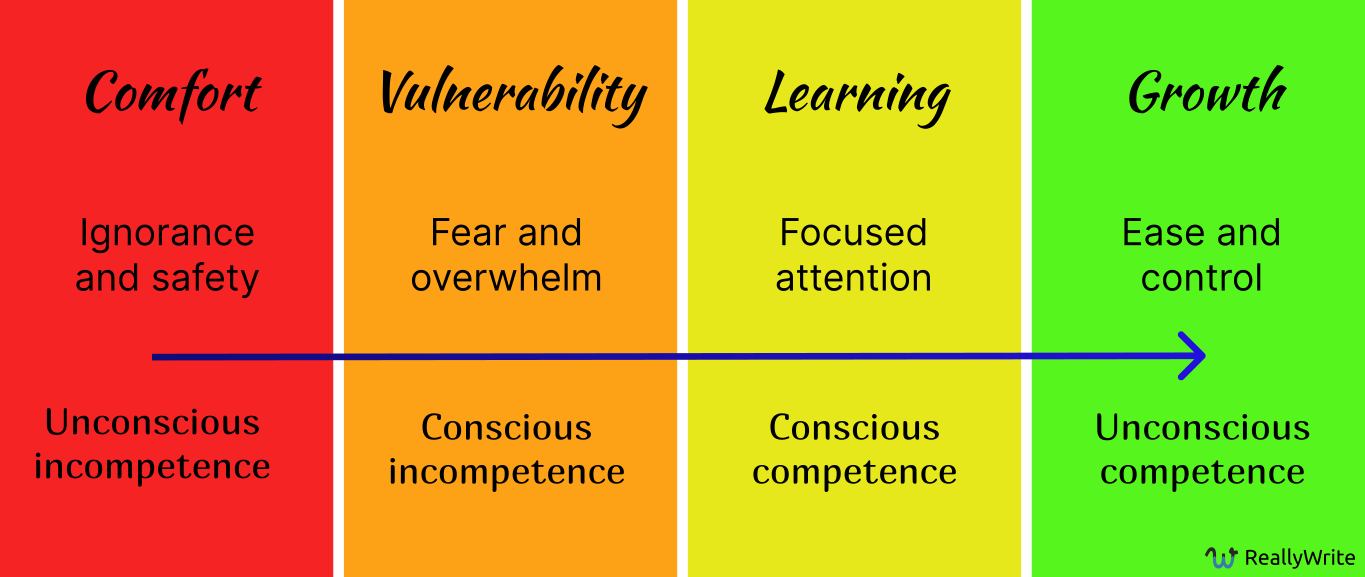How to tell when you are learning

Learning feels uncomfortable
It's human nature to seek pleasure and avoid pain. But when it comes to learning, the proverb is true: no pain, no gain.
Learning is supposed to be hard. It is supposed to make us feel vulnerable and uncertain.
But when we're in the middle of that discomfort and we feel like everything is wrong, we may start to think that we haven't learned anything. Or we may get discouraged and think that we will never learn it. Maybe we want to lash out or give up.
Feeling discouraged can lead us into a vicious cycle: if we cannot see the progress we are making, we may think that we are not making any progress, then we get frustrated at ourselves, which limits our ability to learn, which impedes our progress even more.
It gets worse before it gets better?
To break out of that vicious cycle and get back on track, we can view our progress through the four stages of competence. Even though we may feel like our skills get worse before they get better, they do not actually get worse; we only become aware of what was wrong in the first place.
Maslow's four stages of competence illustrate this learning process:

Students usually join my class when they are unconsciously incompetent and end when they consciously competent.
Unconscious incompetence (onbewust onbekwaam)
You do not know how to do something and do not realize that anything is missing. You may feel like you do not need that skill. Before you can move on to the next stage, you'll first need to recognize that the skill is important and that you are ignorant.
You leave this stage when you decide to start learning something; you recognize that something is missing in your knowledge. This is when you decide to take a class, for example.
Conscious incompetence (bewust onbekwaam)
You still do not know how to do something, but you know that you need to learn it. You've opened your mind to new ideas and are aware of your ignorance. Humility and the freedom to make mistakes are essential here.
You might want to quit. You realize that you didn't know a lot more than you thought, which may feel overwhelming.
Conscious competence (bewust bekwaam)
You've been practicing and you think you've got it! You understand it--in theory. But it still takes effort. You may need to break it down into steps or focus on one thing at a time.
You make fewer mistakes, but you don't feel comfortable yet. You can manage it, but it's exhausting.
Unconscious competence (onbewust bekwaam)
You have had so much practice that the skill has become second nature and takes less effort. You can do it more quickly and with less concentration. You can teach it to others.
You've got this. You radiate confidence.
The first stage: ignorance and comfort
Some people join my academic writing course in this stage, believing that they don't have much to learn. Often more experienced researchers remain at this stage if they have never consciously learned how to write about their research clearly. However, it can be challenging to develop a career when one of your most important skills is unconsciously incompetent.
The second stage: vulnerability
Most people start my course in this second stage. They knew they needed help, in general, but they didn't realize what they didn't know until they joined a class.
Confidence can plummet at this point--all you can see is how "bad" you are, and not how much you are changing week by week. But progress comes in many forms.
How to recognize that you are learning something:
- You can say what you don't know-- you can put a name to it
- You can correct your mistakes when they are pointed out to you
- You can identify your mistakes or recognize when something is "wrong" (even if you don't know what is "right")
- You can ask questions about what you don't know
- You can say what parts you understand and what parts you don't
So please don't get hung up on the fact that you are making mistakes. That's exactly what you should be doing--making mistakes! You should be struggling with difficult concepts--the more you focus on what's difficult, the more you'll learn. No need to be flawless and perfect the first time.
The third stage: clear progress
Most people end my course in this third stage. They are able to talk objectively about their writing with each other, but they haven't had enough practice to internalize their skills. We think that ReallyWrite can be especially useful for researchers who are in these first three stages of learning how to write clearly.
The fourth stage: perfecting your skills
Getting to the fourth stage takes time and practice. You know you're there when the skill feels like second nature. By the time you have internalized the skill, you don't need the kind of help ReallyWrite offers as much anymore. However, ReallyWrite may still be useful in this fourth stage because it can help reduce your mental burden, thus freeing up the mental energy to come up with more creative solutions.
